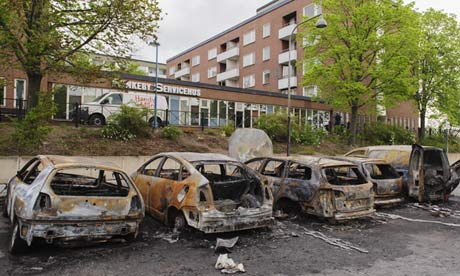Police reinforcements have poured into the capital from provincial districts as Stockholm sought to put an end to a week of rioting, the worst to hit Sweden for years.
Disturbances have spread to 23 suburbs, dozens of cars have been set alight and around 30 people have been detained in connection with the riots, which were touched off on Sunday after police shot dead a man, believed to be Portuguese, who was reportedly wielding a knife.
Although a city police spokesman claimed the situation was at last calming down, further reinforcements arrived on Friday night from Skane, several hundred miles away to the south, as well as from Vastra Gotaland.
On Thursday night, two schools, a police station and 15 cars were set alight. The previous night around 70 cars were reportedly burned.
Few citizens in the city's suburbs appeared to believe that police would be able to prevent the disturbances from continuing after the end of the school week, but there was cautious optimism in the city that the worst of the rioting was over.
"It feels like things have been calmer tonight, at least that's our impression," said police spokeswoman Towe Hägg. "There are a lot of volunteers out on night patrols and that might have helped," she added. Local community leaders were hailed as "heroes" by the prime minister, Fredrik Reinfeldt, for stepping in to help police restore order.
The riots have served as a sharp reminder that despite regular praise for its 'Nordic model' of progressive politics, relatively low unemployment and a generous social safety net, Sweden is not immune to the tension that festers in deprived communities.
The riots began on Sunday in the neighbourhood of Husby, 14km north-west of Stockholm's city centre, a week after police shot a 69-year-old man who was reportedly roaming the area with a machete. According to Stockholm police, the man retreated to an apartment that was stormed by officers who were concerned for the welfare of a female inhabitant. An attempt to disarm the man with a flash grenade was unsuccessful and he was then shot by the police. The incident resulted in groups of young local men setting fire to about 100 vehicles.
Husby was calm on Friday, with children making their way home from school only showing the most cursory interest in burnt-out wrecks under the bridge next to their school.
Although the smashed windows of shops, two schools and the local library had yet to be replaced, locals of the 12,000-strong neighbourhood, which has an 80% immigrant population, said there had been no problems since 20 members of the local Islamic centre went around Husby to talk to the youths involved in the original disturbances.
"They told them that it had to stop and that they were scaring people," said Abdul, a nurse in the local hospital after Friday prayers at the mosque.
"At the moment it's very hard to get jobs – not just here but for everyone in Sweden," said the Moroccan immigrant who had lived in Husby for 11 years. Having registered growth of 6.1% and 3.9% in 2010 and 2011 respectively, the Swedish economy slowed to just 0.8% last year, largely as a result of faltering exports to the eurozone. Residents born outside Sweden represent 15% of the country's 9.5 million population, but account for 35% of those registered as unemployed.
Many of the riots have occurred in cramped neighbourhoods with tall, run-down housing blocks, which were quickly constructed as part of Sweden's "million homes" project in the 1960s and 1970s when Stockholm was in the grip of one of its periodic housing crises. Long-since abandoned by almost all of their original inhabitants, they are often the only source of available housing for migrants and asylum-seekers from war-torn countries.
Sweden's relaxed immigration policy and generous asylum system has resulted in exceptionally high immigration levels over the last decade. In 2012, 82,000 non-Swedes migrated to the country – 44,000 of them were asylum-seekers. The country's migration board expects to receive 54,000 asylum seekers in 2013, including around 20,000 Somalis.
http://www.guardian.co.uk/world/2013/may/24/swedish-police-stockholm-rioting/print


